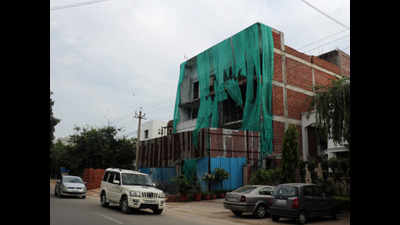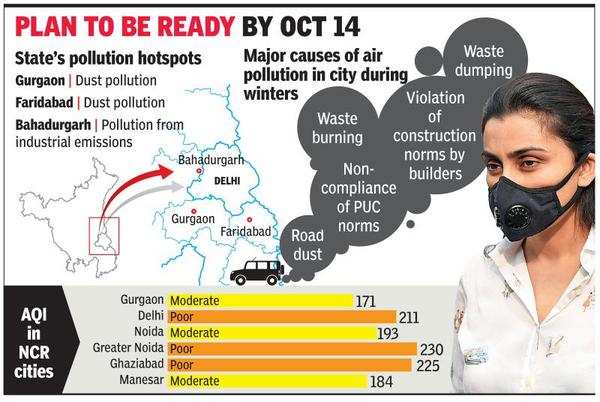- News
- City News
- gurgaon News
- Haryana govt to submit plan for hotspots, genset ban only if air ‘very poor’
Trending
This story is from October 11, 2019
Haryana govt to submit plan for hotspots, genset ban only if air ‘very poor’

File photo used for representational purpose
GURUGRAM: With air pollution levels increasing in the city, the Environment Pollution (Prevention and Control) Authority (EPCA) has directed the chief secretary of Haryana to draft an exclusive plan for the state’s pollution hotspots — Gurgaon, Faridabad and Bahadurgarh.
Interestingly, the authority has directed that corrective and preventive measures be undertaken specifically in Gurgaon’s Udyog Vihar.“Clean action plan will be prepared by the pollution control board for 19 hotspots identified in Faridabad, Bahadurgarh, and Gurgaon (including Udyog Vihar). The plan for each hotspot will include street/avenue/road/sub-area/industry-wise tasks to be undertaken to reduce pollution in winter in each hotspot with deadlines,” states the directions sent by EPCA to the state on Wednesday.
Track the pollution level in your city

Talking about the directive, Haryana State Pollution Control Board (HSPCB) member secretary S Narayanan said, “We have instructed regional officers to submit an action plan for Gurgaon, Faridabad and Bahadurgarh on October 14 for finalisation. It will be further sent to the Central Pollution Control Board (
Activists welcomed EPCA’s move to give specific directions for Udyog Vihar. “Udyog Vihar is one of the most polluted areas in the city since it is an industrial hub. Also, green cover is quite low in the area as compared to residential areas. Every year, we make several complaints of waste burning, visible industrial emissions, road dust and waste dumping in the area. We hope that the specific steps be taken since the EPCA has specifically mentioned Udyog Vihar in the list of pollution hotspots,” said Aseem Takyar, an RTI activist, who has been raising concerns over air pollution in the industrial area.
Meanwhile, after HSPCB on Thursday issued directions to several departments of NCR districts over the blanket ban on diesel generator (DG) sets, it released a corrigendum later saying DG sets would be banned only if the air quality turns ‘very poor’ or ‘severe’. The implementation of ban on diesel generators is part of the Graded Response Action Plan (GRAP) measures in NCR districts from October 15 onwards.
HSPCB’s directions to impose a blanket ban on diesel gensets (regardless of air quality) were contradictory to EPCA’s letter written to the chief secretary on Wednesday, which stated that diesel generators are to be banned when air quality reaches ‘very poor’ or ‘severe’ levels on the CPCB's air quality index. However, earlier EPCA chief Bhure Lal said that a blanket ban will be implemented. There was a lot of confusion regarding the ban on diesel gensets.
Lal could not be contacted for comment.
With the Air Quality Index (AQI) recorded at 171 (‘moderate’), the city’s air pollution levels further rose on Thursday as compared to Wednesday (122), a day after Dussehra. Till Tuesday, the air was ‘satisfactory’.
However, the air quality remained better in Gurgaon than other NCR cities. While Greater Noida was the most polluted in Delhi-NCR on Thursday with an AQI of 230 (‘poor’), Ghaziabad and Delhi also recorded ‘poor’ AQI at 225 and 211, respectively. The AQI in Noida and Manesar, on the other hand, was recorded in the ‘moderate’ category at 193 and 184, respectively.
Interestingly, the authority has directed that corrective and preventive measures be undertaken specifically in Gurgaon’s Udyog Vihar.“Clean action plan will be prepared by the pollution control board for 19 hotspots identified in Faridabad, Bahadurgarh, and Gurgaon (including Udyog Vihar). The plan for each hotspot will include street/avenue/road/sub-area/industry-wise tasks to be undertaken to reduce pollution in winter in each hotspot with deadlines,” states the directions sent by EPCA to the state on Wednesday.
Track the pollution level in your city

The pollution control body has also instructed that the hotspots be strictly monitored. “Monitoring will be done to ensure that there are no instances of waste and garbage burning, that there is full compliance with approved fuel notification... and that all efforts are made to mitigate all sources of pollution,” it said.
Talking about the directive, Haryana State Pollution Control Board (HSPCB) member secretary S Narayanan said, “We have instructed regional officers to submit an action plan for Gurgaon, Faridabad and Bahadurgarh on October 14 for finalisation. It will be further sent to the Central Pollution Control Board (
CPCB) and EPCA. Regional officers will make sure that the measures are followed strictly.”
Activists welcomed EPCA’s move to give specific directions for Udyog Vihar. “Udyog Vihar is one of the most polluted areas in the city since it is an industrial hub. Also, green cover is quite low in the area as compared to residential areas. Every year, we make several complaints of waste burning, visible industrial emissions, road dust and waste dumping in the area. We hope that the specific steps be taken since the EPCA has specifically mentioned Udyog Vihar in the list of pollution hotspots,” said Aseem Takyar, an RTI activist, who has been raising concerns over air pollution in the industrial area.
Meanwhile, after HSPCB on Thursday issued directions to several departments of NCR districts over the blanket ban on diesel generator (DG) sets, it released a corrigendum later saying DG sets would be banned only if the air quality turns ‘very poor’ or ‘severe’. The implementation of ban on diesel generators is part of the Graded Response Action Plan (GRAP) measures in NCR districts from October 15 onwards.
HSPCB’s directions to impose a blanket ban on diesel gensets (regardless of air quality) were contradictory to EPCA’s letter written to the chief secretary on Wednesday, which stated that diesel generators are to be banned when air quality reaches ‘very poor’ or ‘severe’ levels on the CPCB's air quality index. However, earlier EPCA chief Bhure Lal said that a blanket ban will be implemented. There was a lot of confusion regarding the ban on diesel gensets.
Lal could not be contacted for comment.
With the Air Quality Index (AQI) recorded at 171 (‘moderate’), the city’s air pollution levels further rose on Thursday as compared to Wednesday (122), a day after Dussehra. Till Tuesday, the air was ‘satisfactory’.
However, the air quality remained better in Gurgaon than other NCR cities. While Greater Noida was the most polluted in Delhi-NCR on Thursday with an AQI of 230 (‘poor’), Ghaziabad and Delhi also recorded ‘poor’ AQI at 225 and 211, respectively. The AQI in Noida and Manesar, on the other hand, was recorded in the ‘moderate’ category at 193 and 184, respectively.
End of Article
FOLLOW US ON SOCIAL MEDIA










